DELL Laptop Vostro 15 5510 User Manual
Vostro 15 5510Setup and Specifications

Regulatory Model: P106FRegulatory Type: P106F001April 2021Rev. A00
Notes, cautions, and warnings
NOTE: A NOTE indicates important information that helps you make better use of your product.
CAUTION: A CAUTION indicates either potential damage to hardware or loss of data and tells you how to avoid the problem.
WARNING: A WARNING indicates a potential for property damage, personal injury, or death.
© 2021 Dell Inc. or its subsidiaries. All rights reserved. Dell, EMC, and other trademarks are trademarks of Dell Inc. or its subsidiaries. Other trademarks may be trademarks of their respective owners.
Set up your Vostro 15 5510
NOTE: The images in this document may differ from your computer depending on the configuration you ordered.
1. Connect the power adapter and press the power button.
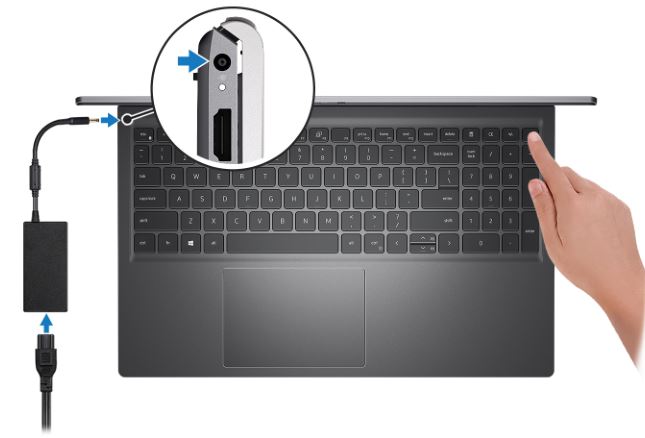
NOTE: To conserve battery power, the battery might enter power saving mode. Connect the power adapter and press the power button to turn on the computer.
2. Finish operating system setup.
For Ubuntu: Follow the on-screen instructions to complete the setup. For more information about installing and configuring Ubuntu, see the knowledge base articles SLN151664 and SLN151748 at www.dell.com/support.
For Windows: Follow the on-screen instructions to complete the setup. When setting up, Dell recommends that you:
- Connect to a network for Windows updates.
NOTE: If connecting to a secured wireless network, enter the password for the wireless network access when prompted.
- If connected to the internet, sign-in with or create a Microsoft account. If not connected to the internet, create an offline account.
- On the Support and Protection screen, enter your contact details.
3. Locate and use Dell apps from the Windows Start menu–Recommended.
Table 1. Locate Dell apps
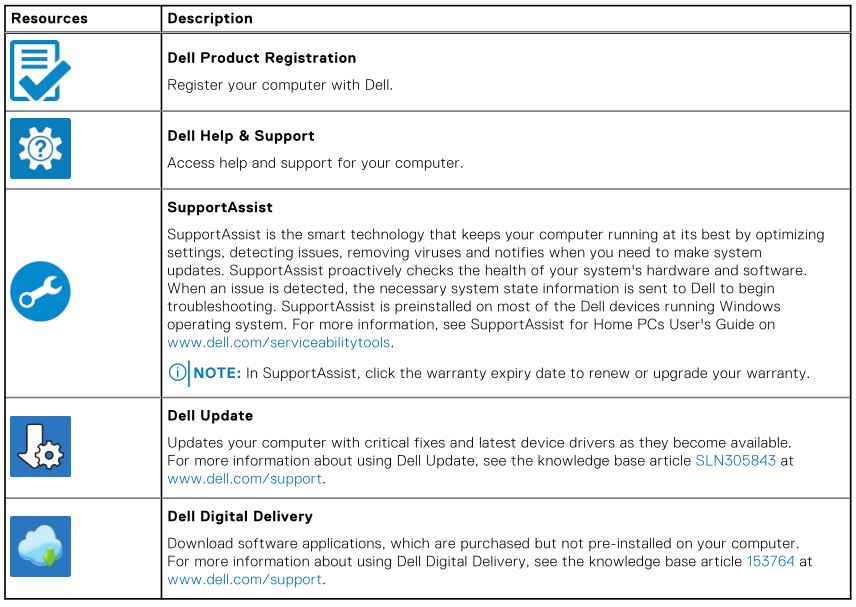
Views of Vostro 15 5510
Topics:
- Right
- Left
- Top
- Front
- Bottom
- Battery charge and status LED
Right

- SD-card slotReads from and writes to the SD card. The computer supports the following card types:
- Secure Digital (SD)
- Secure Digital High Capacity (SDHC)
- Secure Digital Extended Capacity (SDXC)
- USB 3.2 Gen 1 portConnect devices such as external storage devices and printers. Provides data transfer speeds up to 5 Gbps.
- RJ-45 Ethernet portConnect an Ethernet (RJ45) cable from a router or a broadband modem for network or Internet access, with a transfer rate of 10/100/1000 Mbps.
- Global headset jackConnect headphones or a headset (headphone and microphone combo).
- Security-cable slot (wedge-shaped)Connect a security cable to prevent unauthorized movement of your computer.
Left
- Power-adapter portConnect a power adapter to provide power to your computer and charge the battery.
- Power and battery-status lightIndicates the power state and battery state of the computer.Solid white–Power adapter is connected and the battery is charging.Solid amber–Battery charge is low or critical.Off–Battery is fully charged.NOTE: On certain computer models, the power and battery-status light are also used for diagnostics. For more information, see the Troubleshooting section in your computer’s Service Manual.
- HDMI 1.4 portConnect to a TV, external display or another HDMI-in enabled device. Provides video and audio output.
- USB 3.2 Gen 1 portConnect devices such as external storage devices and printers. Provides data transfer speeds up to 5 Gbps.
- USB 3.2 Gen 2×2 Type C port with DisplayPort and Power DeliveryConnect devices such as external storage devices, printers, and external displays. Provides data transfer rate of up to 10 Gbps. Supports Power Delivery that enables two-way power supply between devices. Provides up to 15 W power output that enables faster charging.NOTE: A USB Type-C to DisplayPort adapter (sold separately) is required to connect a DisplayPort device.
- Thunderbolt 4.0 port with Power DeliverySupports USB4, DisplayPort 2.0, Thunderbolt 4 and also enables you to connect to an external display using a display adapter. Provides data transfer rates of up to 40 Gbps for USB4 and Thunderbolt 4.NOTE: You can connect a Dell Docking Station to the Thunderbolt 4 ports. For more information, see the knowledge base article SLN286158 at www.dell.com/support.NOTE: A USB Type-C to DisplayPort adapter (sold separately) is required to connect a DisplayPort device.NOTE: USB4 is backward compatible with USB 3.2, USB 2.0, and Thunderbolt 3.NOTE: Thunderbolt 4 supports two 4K displays or one 8K display.
Top

- Power button with optional fingerprint readerPress to turn on the computer if it is turned off, in sleep state, or in hibernate state. When the computer is turned on, press the power button to put the computer into sleep state; press and hold the power button for 4 seconds to force shut-down the computer. If the power button has a fingerprint reader, place your finger on the power button to log in.NOTE: You can customize power-button behavior in Windows. For more information, see Me and My Dell at www.dell.com/support/manuals.
- TouchpadMove your finger on the touchpad to move the mouse pointer. Tap to left-click and two fingers tap to right-click.
Front

- Left microphoneProvides digital sound input for audio recording and voice calls.
- Privacy shutterSlide the privacy shutter to cover the camera lens and protect your privacy when the camera is not in use.
- CameraEnables you to video chat, capture photos, and record videos.
- Camera-status lightTurns on when the camera is in use.
- Right microphoneProvides digital sound input for audio recording and voice calls.
- LCD panel
Bottom
- Left and right speakersProvides audio output.
- Service Tag labelThe Service Tag is a unique alphanumeric identifier that enables Dell service technicians to identify the hardware components in your computer and access warranty information.
Battery charge and status LED
Table 2. Battery charge and status LED Indicator

- S0 (ON) – Computer is turned on.
- S4 (Hibernate) – The computer consumes the least power compared to all other sleep states. The computer is almost at anOFF state, expect for a trickle power. The context data is written to hard drive.
- S5 (OFF) – The computer is in a shutdown state.
Specifications of Vostro 15 5510
Topics:
- Dimensions and weight
- Processor
- Chipset
- Operating system
- Memory
- Intel Optane Memory H20 with Solid-State Storage (optional)
- External ports
- Internal slots
- Communications
- Audio
- Storage
- Media-card reader
- Keyboard
- Camera
- Touchpad
- Power adapter
- Battery
- Display
- Fingerprint reader (optional)
- GPU–Integrated
- GPU–Discrete
- Operating and storage environment
Dimensions and weight
The following table lists the height, width, depth, and weight of your Vostro 15 5510.
Table 3. Dimensions and weight Description Height:
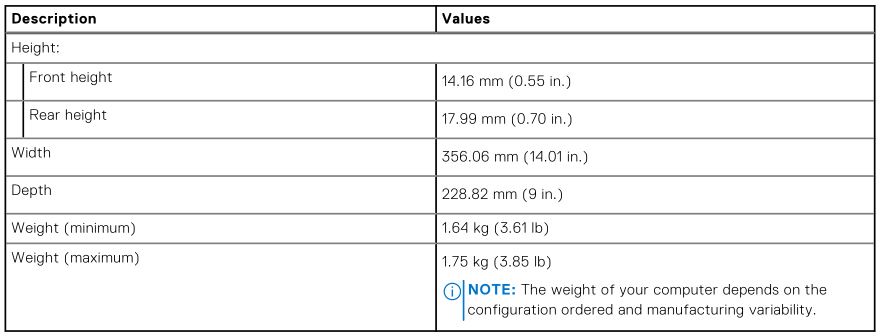
Processor
The following table lists the details of the processors supported by your Vostro 15 5510.
Table 4. Processor Description Processor type

Chipset
The following table lists the details of the chipset supported by your Vostro 15 5510.
Table 5. Chipset Description Chipset

Operating system
Your Vostro 15 5510 supports the following operating systems:
- Windows 10 Pro, 64-bit
- Windows 10 Home, 64-bit
- Ubuntu Linux 20.04 LTS, 64-bit
Memory
The following table lists the memory specifications of your Vostro 15 5510.
Table 6. Memory specifications

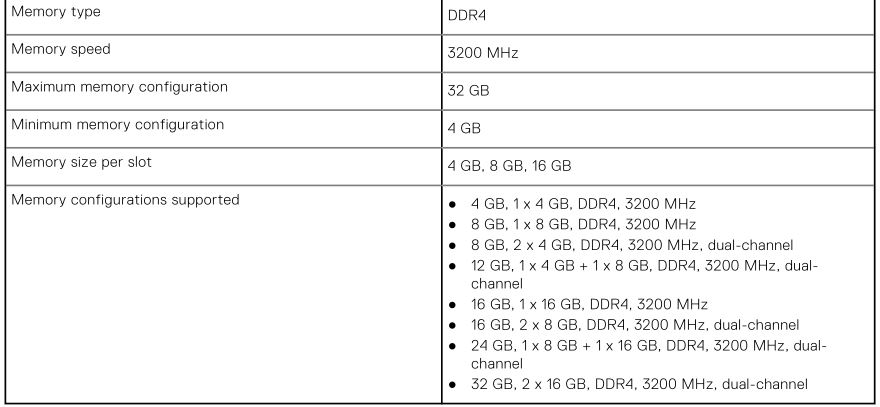
Intel Optane Memory H20 with Solid-State Storage (optional)
Intel Optane Memory technology uses 3D XPoint memory technology and functions as a nonvolatile storage cache/accelerator and/or storage device depending on the Intel Optane Memory that is installed in your system.Intel Optane Memory H20 with Solid-State Storage functions as both a nonvolatile storage cache/accelerator (enabling enhanced read/write speeds for hard drive storage) and a solid-state storage solution. It neither replaces nor adds to the memory (RAM) installed on your system.
Table 7. Intel Optane Memory H20 with Solid-State Storage specifications

NOTE: Intel Optane Memory H20 with Solid-State Storage is supported on systems that meet the following requirements:
- 11th Generation or higher Intel Core i3/i5/i7 processors
- Windows 10 64-bit version or higher (Anniversary Update)
- Intel Rapid Storage Technology driver version 18.1.0.1027 or higher
External ports
The following table lists the external ports of your Vostro 15 5510.
Table 8. External ports

Internal slots
The following table lists the internal slots of your Vostro 15 5510.
Table 9. Internal slots 
Communications
Ethernet
Table 10. Ethernet specifications

Wireless module
Table 11. Wireless module specifications
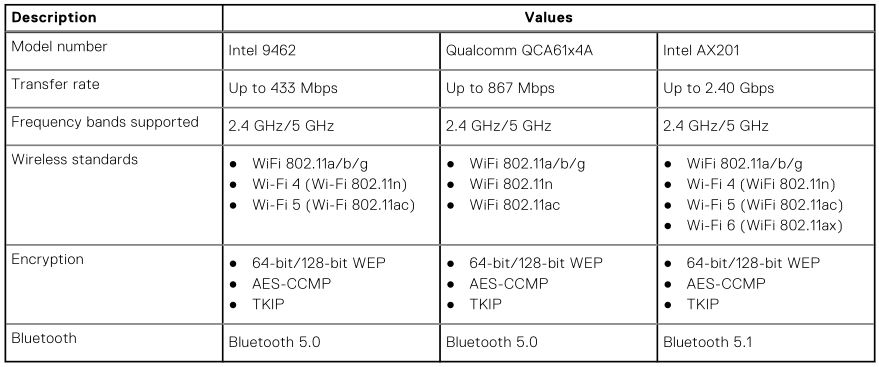
Audio
The following table lists the audio specifications of your Vostro 15 5510.
Table 12. Audio specifications
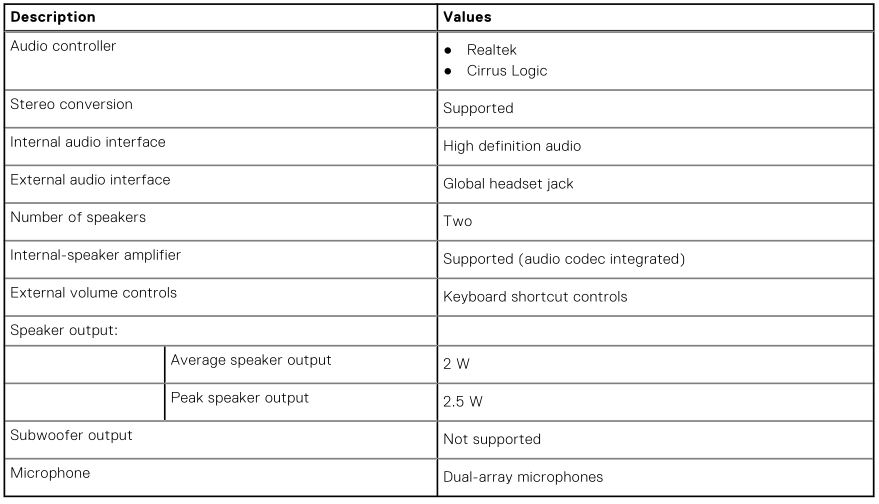
Storage
This section lists the storage options on your Vostro 15 5510.Your computer supports one of the following configurations:
- M.2 drive x1
- M.2 drive x2
The primary drive of your computer varies with the storage configuration. For systems with a M.2 drive, the M.2 drive is the primary drive.
Table 13. Storage specifications

Media-card reader
The following table lists the media cards supported by your Vostro 15 5510.
Table 14. Media-card reader specifications

Keyboard
The following table lists the keyboard specifications of your Vostro 15 5510.
Table 15. Keyboard specifications


Camera
The following table lists the camera specifications of your Vostro 15 5510.
Table 16. Camera specifications

Touchpad
The following table lists the touchpad specifications of your Vostro 15 5510.
Table 17. Touchpad specifications

Power adapter
The following table lists the power adapter specifications of your Vostro 15 5510.
Table 18. Power adapter specifications

Battery
The following table lists the battery specifications of your Vostro 15 5510.
Table 19. Battery specifications


Display
The following table lists the display specifications of your Vostro 15 5510.
Table 20. Display specifications
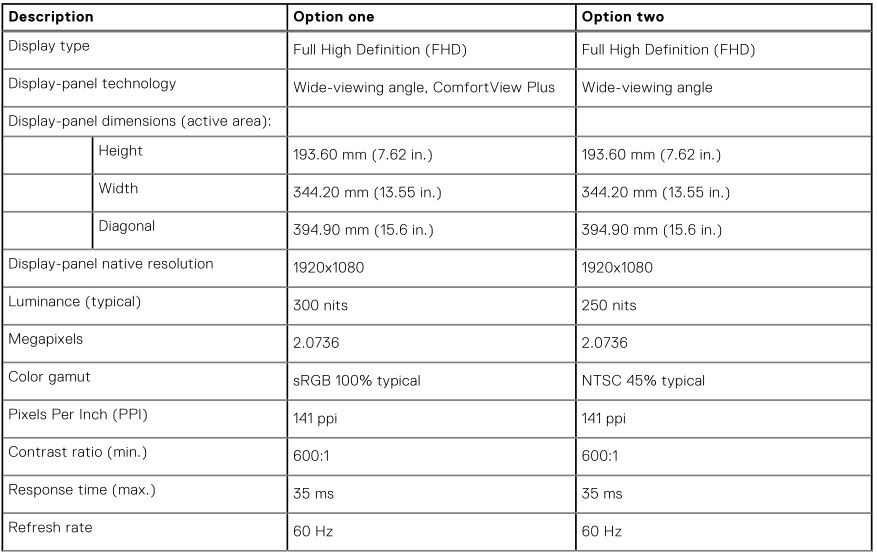

Fingerprint reader (optional)
The following table lists the specifications of the optional fingerprint-reader of your Vostro 15 5510.
Table 21. Fingerprint reader specifications

GPU–Integrated
The following table lists the specifications of the integrated Graphics Processing Unit (GPU) supported by your Vostro 15 5510.
Table 22. GPU–Integrated

GPU–Discrete
The following table lists the specifications of the discrete Graphics Processing Unit (GPU) supported by your Vostro 15 5510.
Table 23. GPU–Discrete

Operating and storage environment
This table lists the operating and storage specifications of your Vostro 15 5510.Airborne contaminant level: G1 as defined by ISA-S71.04-1985
Table 24. Computer environment

* Measured using a random vibration spectrum that simulates user environment.Measured using a 2 ms half-sine pulse when the hard drive is in use.
Keyboard shortcuts
NOTE: Keyboard characters may differ depending on the keyboard language configuration. Keys used for shortcuts remain the same across all language configurations.
Some keys on your keyboard have two symbols on them. These keys can be used to type alternate characters or to perform secondary functions. The symbol shown on the lower part of the key refers to the character that is typed out when the key is pressed. If you press shift and the key, the symbol shown on the upper part of the key is typed out. For example, if you press 2, 2 is typed out; if you press Shift + 2, @ is typed out.
The keys F1-F12 at the top row of the keyboard are function keys for multi-media control, as indicated by the icon at the bottom of the key. Press the function key to invoke the task represented by the icon. For example, pressing F1 mutes the audio (refer to the table below).However, if the function keys F1-F12 are needed for specific software applications, multi-media functionality can be disabled by pressing fn + Esc. Subsequently, multi-media control can be invoked by pressing fn and the respective function key. For example, mute audio by pressing fn + F1.
NOTE: You can also define the primary behavior of the function keys (F1F12) by changing Function Key Behavior in BIOS setup program.
Table 25. List of keyboard shortcuts
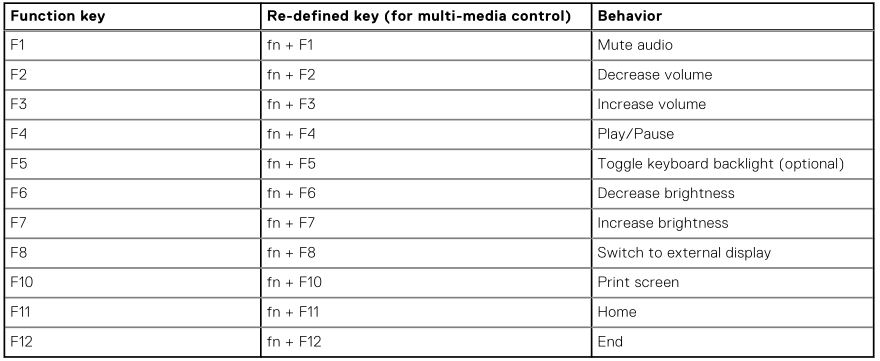
The fn key is also used with selected keys on the keyboard to invoke other secondary functions.
Table 26. List of keyboard shortcuts


Getting help
Topics:· Contacting Dell
Contacting Dell
NOTE: If you do not have an active Internet connection, you can find contact information on your purchase invoice, packing slip, bill, or Dell product catalog.
Dell provides several online and telephone-based support and service options. Availability varies by country and product, and some services may not be available in your area. To contact Dell for sales, technical support, or customer service issues:
- Go to Dell.com/support.
- Select your support category.
- Verify your country or region in the Choose a Country/Region drop-down list at the bottom of the page.
- Select the appropriate service or support link based on your need.
[xyz-ips snippet=”download-snippet”]

